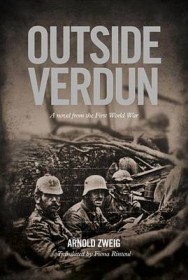
ABOUT THIS BOOK
PUBLISHER: Freight Books
FORMAT: Paperback
ISBN: 9781908754523
RRP: £12.99
PAGES: 432
PUBLICATION DATE:
May 9, 2014
BUY THIS BOOK
As an Amazon Associate and Bookshop.org affiliate we earn from qualifying purchases.
Outside Verdun
Arnold Zweig
‘The war, an operation instigated by men, still felt to him like a storm decreed by fate, an unleashing of powerful elements, unaccountable and beyond criticism.’ A stunning new translation, this is the first UK publication of a forgotten masterpiece of First World War German literature in the anniversary year of the commencement of hostilities. Arnold Zweig’s Outside Verdun was first published in 1933 and is entirely based on his own, first-hand experiences of the German army during World War 1. Following the unlawful killing of his younger brother by his own superiors, Lieutenant Kroysing swears revenge, using his influence to arrange for his brother’s unit, normally safely behind the lines, to be reassigned to the fortress at Douaumont, in the very heart of the battle for France. Bertin, a lowly but educated Jewish private in the army service corps through whose eyes the story unfolds, is the innocent man caught in the cross-fire.Outside Verdun not only explores the heart-breaking tragedy of one individual trapped in a nightmare of industrialised warfare but also reveals the iniquities of German society in microcosm, with all its injustice, brutality, anti-Semitism and incompetence. Fiona Rintoul’s brilliant translation captures all the subtleties, cadences and detachment of Zweig’s masterful prose.
Arnold Zweig
Arnold Zweig (10 November 1887 – 26 November 1968) was a German writer and anti-war activist. He is best known for his World War I tetralogy of which Outside Verdun is part. Zweig volunteered for the German army in World War I and saw action as a private in France, Hungary and Serbia. He was stationed in the Western Front at the time when Judenzahlung (the Jewish census) was undertaken. After World War I he was an active socialistic Zionist in Germany. Following Hitler’s attempted coup in 1923 Zweig went to Berlin and worked as an editor of a newspaper, the Judische Rundschau. Zweig would later witness the burning of his books by the Nazis. When the Nazis took power in 1933, Zweig was one of many Jews to go into voluntary exile, first to Czechoslovakia, then Switzerland and France and finally Palestine. In 1948, after a formal invitation from the East German authorities, Zweig decided to return to the Soviet occupation zone in Germany where he became a member of parliament. He was President of the German Academy of the Arts from 1950-53.









